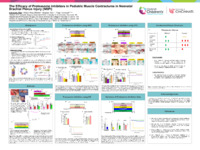The Efficacy of Proteasome Inhibitors in Pediatric Muscle Contractures in Neonatal Brachial Plexus Injury (NBPI)
Main Article Content
Abstract
By Indranshu Das, Medical Sciences
Advisor: Qingnian Goh
Presentation ID: 59
Abstract: Neonatal Brachial Plexus Injury (NBPI) is the most common birth injury, and leads to the formation of incurable muscle contractures, or joint stiffness. These contractures severely limit mobility and functional use of the limb, resulting in deformity and dysfunction. Contractures are caused by impaired longitudinal growth of denervated muscles, and this deficit in muscle length is driven by elevated levels of proteasome-mediated protein degradation. As proof of concept, we previously showed that treatment with Bortezomib, a proteasome inhibitor, successfully prevented contractures in a mouse model of NBPI. In this current study, we investigated the efficacy and therapeutic windows of additional classes of proteasome inhibitors in contracture prevention. Using our established mouse model of NBPI, we discovered that newer-generation of proteasome inhibitors prevented elbow and shoulder contractures at narrow dose ranges, but their therapeutic windows differed. Specifically, Marizomib (MRZ) differentially prevented elbow and shoulder contractures at distinct doses. In contrast, low doses of Carfilzomib (CFZ) and Ixazomib (IXZ) led to peak reductions in elbow and contracture severity. While CFZ is associated with high survival rates at all doses, high doses of MRZ and IXZ led to increased mortality. As all classes of proteasome inhibitors are able to reduce contracture formation, these results further validate the proteasome as a key regulator of NBPI-induced contractures. Furthermore, the narrow dose ranges of efficacy highlight the need for precise proteasome regulation in contracture prevention. Lastly, the toxicity of systemic proteasome inhibition highlights the need to identify muscle-specific targets for suppressing protein degradation to prevent contractures.
